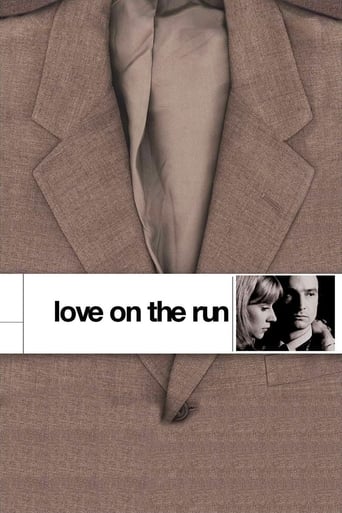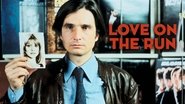morrison-dylan-fan
Getting set to watch 100 French films over 100 days I decide that it was time to take a look at some French Videos that my dad had picked up for 10p each (a drop from the £17 they were sold at in HMV!) Since having watched two of his works in May,I was delighted to spot a rather overlooked François Truffaut title,which led to me getting ready to see love go on the run.The plot:Shortly after getting a divorce from his wife Christine, proof reader (and novelist) Antoine Doinel crosses paths with his teenage love Colette Tazzi.Spotting Doinel,Tazzi remembers that she has still not picked up his autobiography.Picking up the book,Tazzi soon discovers that Doinel's memories of the relationship are very different to her own.View on the film:Despite being labelled "A swindle" by its own creator, (who made it to get some much needed cash for his production company) co- writer/(along with Jean Aurel, Suzanne Schiffman and actress Marie- France Pisier) director François Truffaut & cinematographer Néstor Almendros get the movie to rise out of its clip show trappings,by giving Doinel's criss-crossing with his past lovers a crystal clear clarity which melts into a dizzying final shot.Throwing clips in from the other Doinel films into the mix, Truffaut does very well at changing the context of them,with the new narration making the grainy clips look like fading memories.While it never settles down,the screenplay by Truffaut/Schiffman and Almendros takes advantage of the clips to strike a wonderfully contrasting picture of Doinel,via the clips as memories revealing that Doinel is still caught in a childish mind-set.Joined by alluring co-writer Marie-France Pisier as Colette Tazzi, Jean-Pierre Léaud gives a great performance as Doinel,thanks to Léaud twisting and turning every attempt Doinel makes to avoid a serious relationship,as Léaud and Truffaut wave farewell to Antoine Doinel.
Claudio Carvalho
Antoine Doinel (Jean-Pierre Léaud) is having a love affair with the vinyl seller Colette Tazzi (Marie-France Pisier). After five years of a troubled marriage with separations, Antoine and Christine Doinel (Claude Jade) have a private audience with the judge (Marie Henriau) and conclude an amicable divorce process. His former sweetheart and presently lawyer Colette Tazzi (Marie-France Pisier) sees Antoine leaving the court and she goes to a bookstore to buy his autobiographical novel that was published a couple of years ago. When Antoine goes with Alphonse (Julien Dubois) to the train station for the travel vacation of his son, he sees Colette in another train and he jumps from the platform to the train and travels with her. They recall their adolescent love and disclose their sentimental relationships; but when Colette tells how she raises money for her self-support, Antoine is disappointed and seeks out Sabine."L'Amour en Fuite" is the conclusion of the sentimental saga of the character Antoine Doinel, the insecure alter ego of François Truffaut that began in "Les Quatre Cents Coups" and followed through "L'Amour à Vingt Ans", "Baisers Volés" and "Domicile Conjugal", inclusive with the use of scenes in the many flashbacks of these movies with his recollections and troubled love affairs. This character has an evolution from the needy fourteen years old boy rejected by his mother and his stepfather in the first movie. The lack of affection at home makes him a rebel, bad student, liar, reckless and a thief stealing objects and money at home in his adolescence. In the next movies, he grows-up, but with a fragile emotional structure and the viewer sees an unstable man incapable of having a steady relationship or commitment with the many beautiful women that he meets along his futile life. My vote is seven.Title (Brazil): "O Amor em Fuga" ("The Love on the Run")
MartinHafer
This is the final film about the character, Antoine Doinel. He first appeared in The 400 Blows and you see him in 5 Truffaut films over the years. You see him grow from an emotionally neglected little punk in the first film and by the fifth, he is a Woody Allen-like little guy who has had a long series of troubled relationships that he ultimately sabotaged due to his discomfort with emotional commitment. He has a great time falling in love but soon strays or otherwise causes the relationships to sour.The plot and emotional growth of the character is excellent. So why only a 7 for this film? Well, much of the film is simply cut and pasted from the previous Antoine Doinel films. This gave it a certain cheap look. Plus, what I really found inexplicable was that Truffaut used clips from Jean-Pierre Léaud films that were NOT about Doinel but pretended the clips were about him. In addition, clips from some Doinel films were shown but the entire scene is re-dubbed or explained in a way in which the scene did NOT appear in the original film. A good example is a clip from Stolen Kisses. The narrator says he (Doinel) was unlucky in love and followed attractive women because he'd become infatuated with them. However, this scene was actually of Doinel following a lady because he was a private detective in this film--this was NOT someone he was infatuated with. Those who remember this movie well will be shocked at how easy it is to spot this obvious change. Finally, for some odd reason, one of the clips from Stolen Kisses is shown in black and white, while all the others from the movie are in color. It just didn't make sense why this occurred.These inconsistencies are not great film-making. Decent film-making, maybe. For a better Truffaut film, try watching The Bride Wore Black (my personal favorite) or Wild Child or The Story of Adele H.
Mikew3001
This is the fifth and last part of Francois Truffauts Antoine Doinel cycle, a biographical movie series about the growing up of a romantic Parisian, played by Jean Pierre Leaud all the time, and all his struggles with love and life which was produced over a period of 20 years.This last part from 1978 shows us Doinel doing what he's also doing in the previous four parts - falling in love with numerous women, trying to keep up relationships, looking for love, flirting etc. While the first part from 1959 showed us Doinel's childhood in a poor family with a hard and beating father and his longing for respect and love, the following parts are less interesting in my opinion.The final chapter is rather superfluous, with jokes falling flat, no real script, no suspense or a really interesting story line, and the actors are just running around most of the time. If you have watched the previous Doinel films it might be interesting to see this sequel (which is not really an end), but I suggest you to watch the first Doinel movie "Les 400 coups" ("The 400 Blows") instead, or Truffauts "L'homme qui l'amait les femmes" ("The Man Who Loved Women"), a far more interesting study on love, obsession and fetishism.




